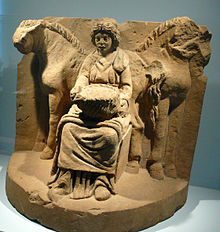 Global Information
Global InformationCeltic deities information


The gods and goddesses of the pre-Christian Celtic peoples are known from a variety of sources, including ancient places of worship, statues, engravings, cult objects, and place or personal names. The ancient Celts appear to have had a pantheon of deities comparable to others in Indo-European religion, each linked to aspects of life and the natural world. Epona was an exception and retained without association with any Roman deity. By a process of syncretism, after the Roman conquest of Celtic areas, most of these became associated with their Roman equivalents, and their worship continued until Christianization. Pre-Roman Celtic art produced few images of deities, and these are hard to identify, lacking inscriptions, but in the post-conquest period many more images were made, some with inscriptions naming the deity. Most of the specific information we have therefore comes from Latin writers and the archaeology of the post-conquest period. More tentatively, links can be made between ancient Celtic deities and figures in early medieval Irish and Welsh literature, although all these works were produced well after Christianization.
The locus classicus for the Celtic gods of Gaul is the passage in Julius Caesar's Commentarii de Bello Gallico (The Gallic War, 52–51 BC) in which he names six of them, together with their functions. He says that Mercury was the most honoured of all the deities and many images of him were to be found. Mercury was regarded as the inventor of all the arts, the patron of travellers and of merchants, and the most powerful deity in matters of commerce and gain. After him, the Gauls honoured Apollo, who drove away diseases, Mars, who controlled war, Jupiter, who ruled the heavens, and Minerva, who promoted handicrafts. He adds that the Gauls regarded Dis Pater as their ancestor.[1]
In characteristic Roman fashion, Caesar does not refer to these figures by their native names but by the names of the Roman deities with which he equated them, a procedure that complicates the task of identifying his Gaulish deities with their counterparts in the insular Celtic literatures. He also presents a neat schematic equation of deity and function that is quite foreign to the vernacular literary testimony. Yet, given its limitations, his brief catalog is a valuable witness.
The deities named by Caesar are well-attested in the later epigraphic record of Gaul and Britain. Not infrequently, their names are coupled with native Celtic theonyms and epithets, such as Mercury Visucius, Lenus Mars, Jupiter Poeninus, or Sulis Minerva. Unsyncretised theonyms are also widespread, particularly among goddesses such as Sulevia, Sirona, Rosmerta, and Epona. In all, several hundred names containing a Celtic element are attested in Gaul. The majority occur only once, which has led some scholars to conclude that the Celtic deities and their cults were local and tribal rather than national. Supporters of this view cite Lucan's mention of a deity called Teutates, which they interpret as "god of the tribe" (it is thought that teuta- meant "tribe" in Celtic).[2] The multiplicity of deity names may also be explained otherwise – many, for example, may be simply epithets applied to major deities by widely extended cults.[citation needed]
- ^ Julius Caesar, Commentarii de Bello Gallico 6:17-18
- ^ Paul-Marie Duval, Les dieux de la Gaule, Éditions Payot, Paris, 1993. ISBN 2-228-88621-1